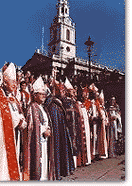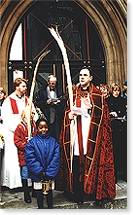
|
 |
|

An Episcopal Tradition | An Introduction to Anglicanism!
The Scriptures and the Gospels, the Apostolic Church and the early Church Fathers, are the foundation of Anglican faith and worship. The basic tenets of being an Anglican are:
* We view the Old and New Testaments 'as containing all things necessary for salvation' and as being the rule and ultimate standard of faith.
* We understand the Apostles' creed as the baptismal symbol, and the Nicene creed as the sufficient statement of the Christian faith.
* The two sacraments ordained by Christ himself - Baptism and the Supper of the Lord - are administered with unfailing use of Christ's words of institution, and the elements are ordained by him.
* The historic episcopate is locally adapted in the methods of its administration to the varying needs of the nations and peoples called of God into the unity of his Church.
|
| 
palms | Anglicans trace their Christian roots back to the early Church, and their specifically Anglican identity to the post-Reformation expansion of the Church of England and other Episcopal or Anglican Churches. Historically, there were two main stages in the development and spread of the Communion. Beginning with the seventeenth century, Anglicanism was established alongside colonisation in the United States, Australia, Canada, New Zealand and South Africa. The second state began in the eighteenth century when missionaries worked to establish Anglican churches in Asia, Africa and Latin America.
As a worldwide family of churches, the Anglican Communion has more than 70 million adherents in 38 Provinces spreading across 161 countries. Located on every continent, Anglicans speak many languages and come from different races and cultures. Although the churches are autonomous, they are also uniquely unified through their history, their theology, their worship and their relationship to the ancient See of Canterbury.
Anglicans uphold the Catholic and Apostolic faith. Following the teachings of Jesus Christ, the Churches are committed to the proclamation of the good news of the Gospel to the whole creation. In practice this is based on the revelation contained in Holy Scripture and the Catholic creeds, and is interpreted in light of Christian tradition, scholarship, reason and experience.
By baptism in the name of the Father, Son and Holy Spirit, a person is made one with Christ and received into the fellowship of the Church. This sacrament of initiation is open to children as well as to adults.
Central to worship for Anglicans is the celebration of the Holy Eucharist, also called the Holy Communion, the Lord's Supper or the Mass. In this offering of prayer and praise, the life, death and resurrection of Jesus Christ are recalled through the proclamation of the word and the celebration of the sacrament. Other important rites, commonly called sacraments, include confirmation, holy orders, reconciliation, marriage and anointing of the sick.
Worship is at the very heart of Anglicanism. Its styles vary from simple to elaborate, or even a combination. The great uniting text is The Book of Common Prayer, in its various revisions throughout the Communion. The Book of Common Prayer, alongside additional liturgies gives expression to the comprehensiveness found within the Church whose principles reflect that of the via media in relation to its own and other Christian Churches.
The Book of Common Prayer (1662) is a permanent feature of the Church of England's worship. It is loved for its beauty of language and the services which it contains are widely used (in their entirety or in adapted form). It is also the foundation of a tradition of common prayer and is a fundamental source of Church of England doctrine.
|
| 
Cross | The Scottish Church made certain modifications to The Book of Common Prayer and its wholehearted retention by the new Protestant Episcopal Church of the USA as well as the emerging dominions and dependencies, ensured its place as a key ingredient of the growing Anglican Communion. Despite its widespread use, it did not emerge from the horrors of the Great War (World War 1) without criticism. A modest revision prepared during the 1920s was not approved by Parliament.
The Lambeth Conferences of the 1950s and 1960s called for more up-to-date national liturgies and this is going on today. No matter how distinctive each is, they are all clearly of the lineage of The Book of Common Prayer.
Another distinguishing feature of the corporate nature of Anglicanism is that it is an interdependent Church, where parishes, dioceses and provinces help each other to achieve by mutual support in terms of financial assistance and the sharing of other resources.
To be an Anglican is to be on a journey of faith to God supported by a fellowship of co-believers who are dedicated to finding Him by prayer and service.
See also Canon James Rosenthal The Essential Guide to the Anglican Communion Morehouse Publishing, Harrisburg, Penn, USA ISBN 0-8192-1743-3 containing several excellent articles on what Anglicans believe in and other elements of the faith and The Revd. Richard Giles, We do not presume ... Canterbury Press, Norwich, UK ISBN 1-85311-203-8. |
|
The above is taken from the official Church of England website. If you would like to follow this, or other topics with regard to the Anglican Tradition of Christianity. Please follow the link below: | | Church of England Website |
|



